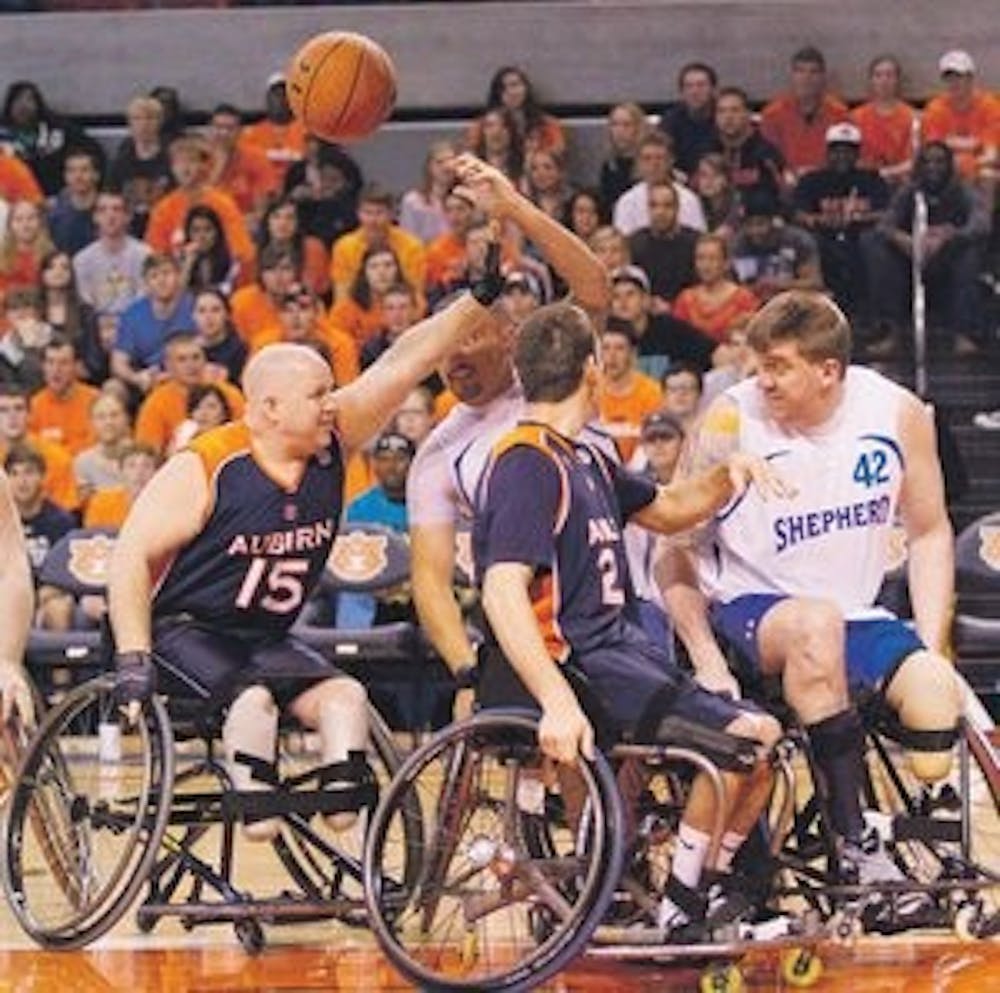The university's wheelchair basketball team is entering its third season and its \0x8Afirst season in the National Wheelchair Basketball Association's Intercollegiate Division. The team held an open practice Tuesday, Sept. 4 in the Beard-Eaves Memorial Coliseum.
"We have been a part of the Wheelchair Basketball Association for the past two years, but now we are moving into the intercollegiate division," said Jared Rehm, doctoral student in biomechanics. "We will be playing against other colleges and universities that have wheelchair sports programs."
\0x1FThe team has six scheduled tournaments in Auburn, Birmingham, Tuscaloosa, Atlanta, Augusta, Ga. and Champaign, Ill.
"It's a different level athletically," Rehm said. "It's also cool because we are playing against student-athletes and representing Auburn as student-athletes."
Rehm has spina bifida and has participated in wheelchair basketball for 13 years. Rehm played basketball for the University of Wisconsin Whitewater and came to Auburn in 2008. He is now a player and coach for Auburn's team.
Rehm said in the spring of 2009 he discovered the Office of Accessibility was interested in starting a wheelchair basketball team, and he began meeting with Nathan Waters, disability specialist with the Office of Accessibility, to form the team. Waters said a campus organization named Adaptive Recreation and Athletics was then formed. He was the \0x8Afirst president of the organization as a graduate student.
"From the very beginning everybody encouraged us that it was a great idea, but there was no room in the budget," Waters said. "We went to the athletic department and got turned down. We went to the president's office and got turned down for funding. They all said keep pursuing it and develop it."
Waters works with the finances and scheduling for the team. When more students want to come to Auburn to be involved with the program, the program will see more \0x8Afinancial support, Waters said.
"Players don't have to be everyday wheelchair users," Waters said. "Some of them have disabilities that would not allow them to play in traditional stand-up basketball, that prevent them from running and jumping. But when they get in a wheelchair, they can play with anybody."
"To be eligible for play in the NWBA, a player must have an irreversible lower extremity disability, such as paralysis, amputation, radiological evidence of limb shortening, partial to full joint alkalosis or joint replacement, which consistently interferes with functional mobility," according to the National Wheelchair Basketball Association.
"A lot of people don't realize that to play wheelchair basketball doesn't mean you have to be in a wheelchair all the time," Rehm said. "To qualify you just have to have a permanent lower limb disability. So, like an amputee would qualify."
Rehm said for the next five years the team will have an associate status and anyone in the area can play on the team. After that, players will need to be either Auburn students or students at a college within 25 miles of Auburn.
"We'd like to have two teams going, one for community players and one for student athletes," Rehm said. "So if there is a community member and they want to get involved, they don't need to be afraid that they'll only be able to play for a couple of years and then we are going to drop them off and they'll never play again."
Wheelchair tennis is also available for students. \0x1FThere is an adaptive weight room available open Monday, Wednesday and Friday from 5 to 6 p.m. on the first floor of the Coliseum 1129.
"The biggest eye-opener to me, the \0x8Afirst time I heard about wheelchair basketball in general is that having a disability or being in a wheelchair doesn't mean you can't be athletic," said Jon Morris, a freshman in social work. "We represent Auburn just like any other sport."
\0x1FThis is Morris' second season playing with Auburn's wheelchair basketball team. He is a T3 paraplegic.
"Because we are a brand new team, and wheelchair basketball itself isn't that widely known of a sport, we really need to raise awareness that we have a team and we need more players," Morris said.
Morris said he wrestled in high school and now plays wheelchair football. He is beginning to participate in wheelchair racing.
"We are not exactly a club sport because they are not all students, and we aren't in the athletic department because we are not an NCAA sport," Rehm said. "Trying to \0x8Afigure out exactly where we \0x8Afit in has de\0x8Afinitely been a challenge."
Waters said he wants students to support the team, just like any other athletic team on campus.
Rehm said three people volunteering for the team do not have disabilities. "\0x1FThat's what I would like for more students to be more aware of, is that these guys are athletes," Waters said.
"\0x1FThey are going to have a schedule that looks like any other sports team on campus. They are working hard and have a full schedule of games."
Do you like this story? The Plainsman doesn't accept money from tuition or student fees, and we don't charge a subscription fee. But you can donate to support The Plainsman.





